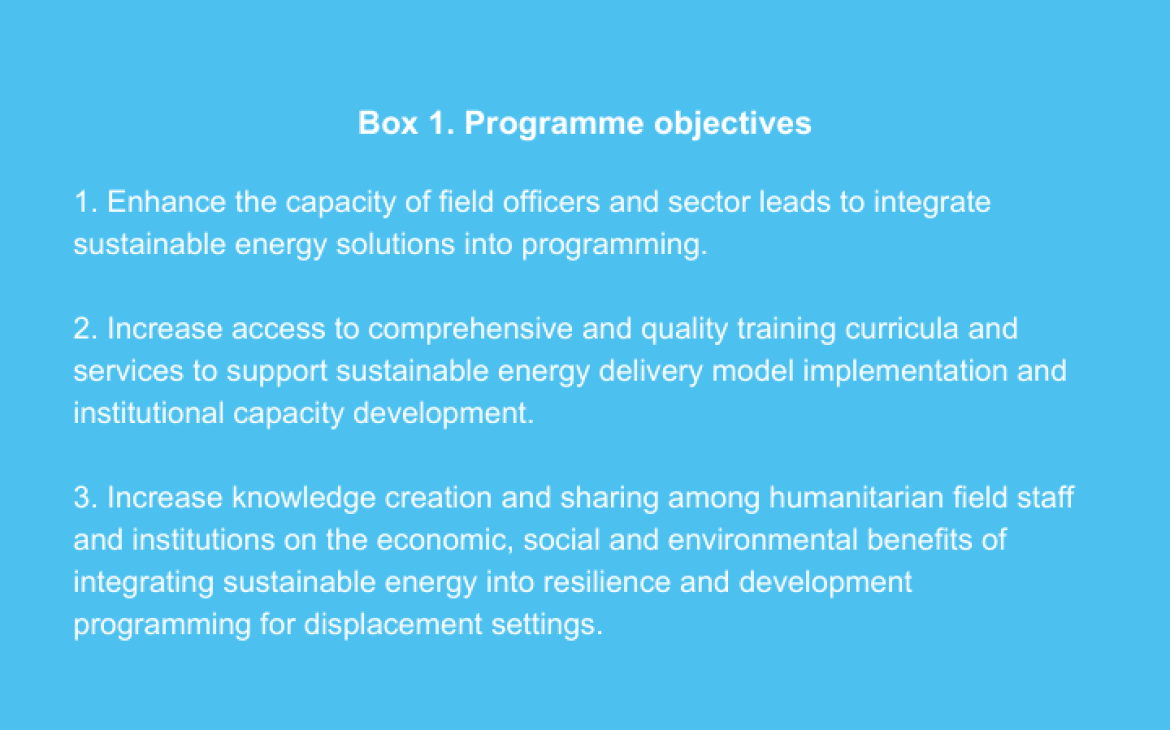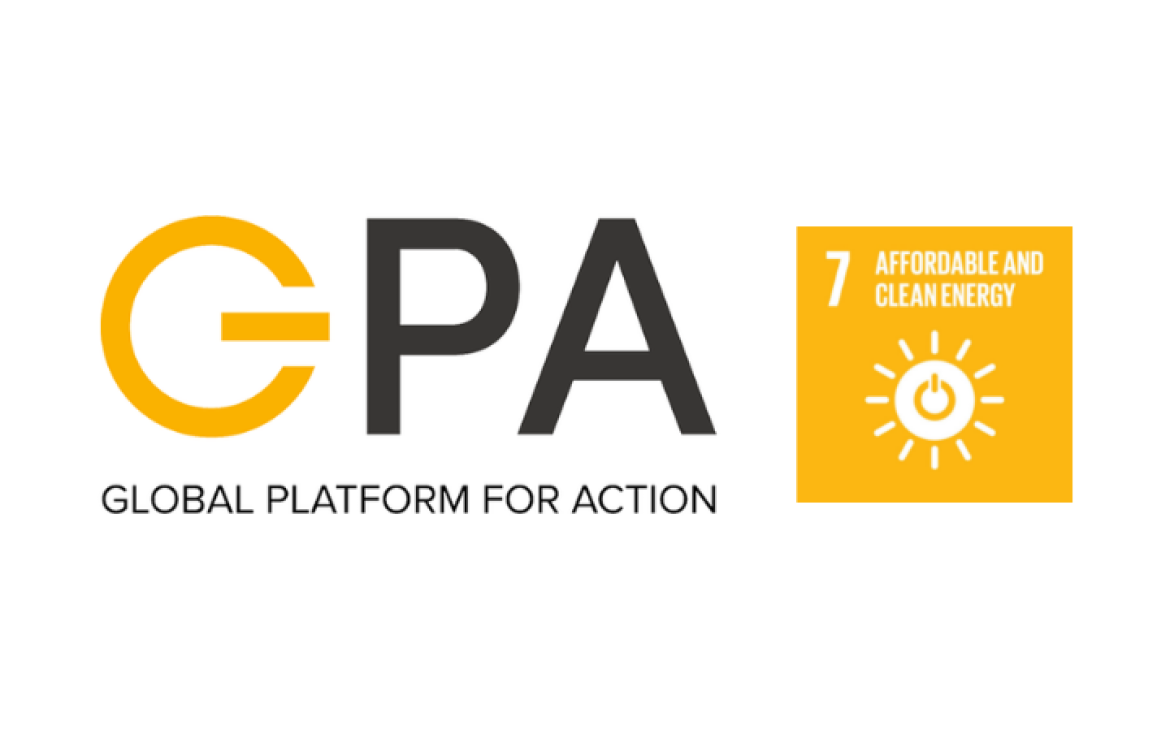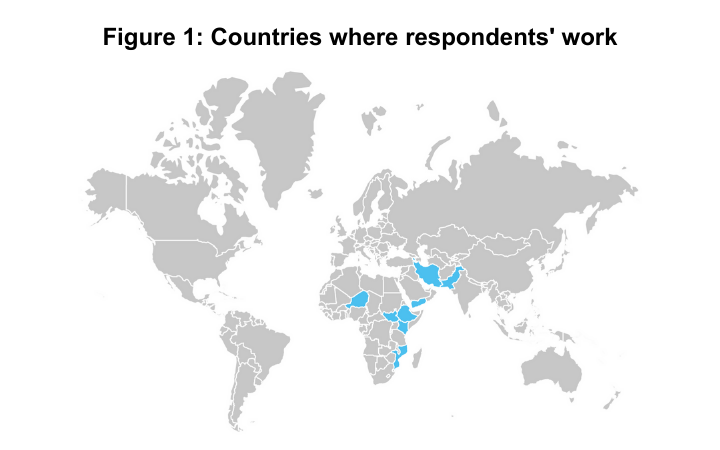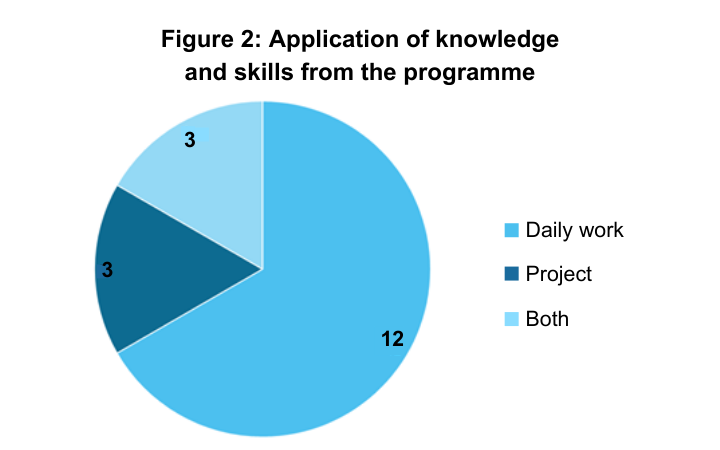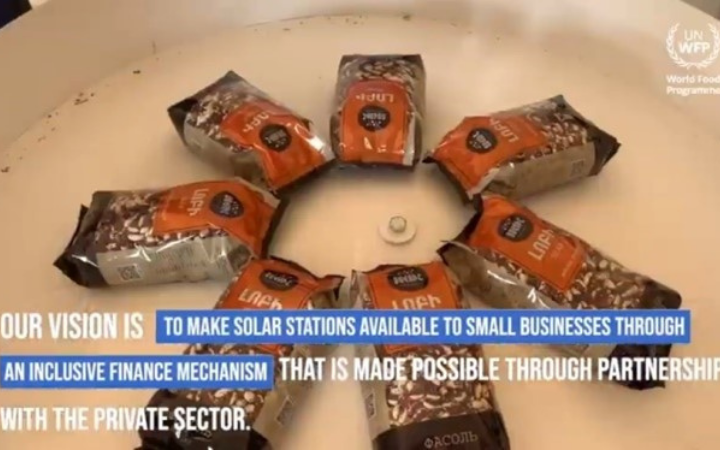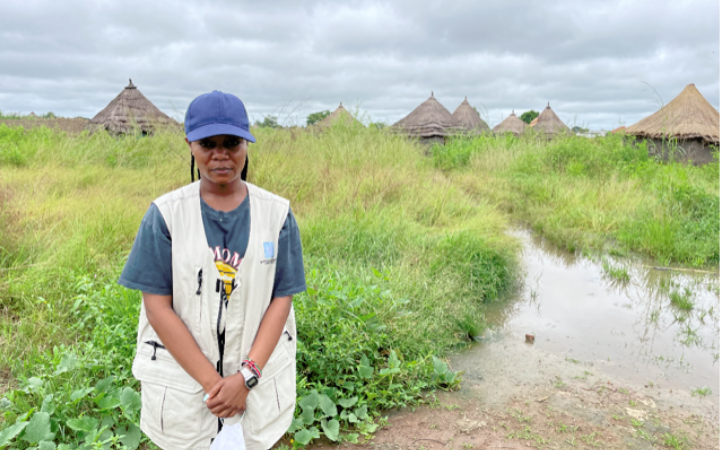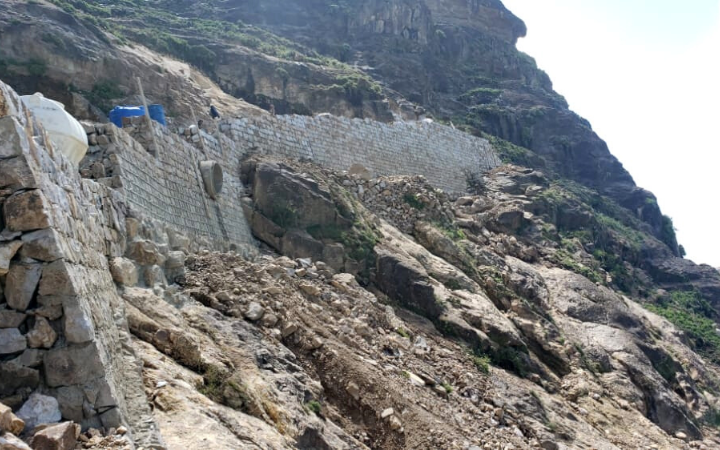Background
The Global Platform for Action (GPA) is a global initiative to promote actions that enable sustainable energy access in displacement settings, contributing to SDG 7: Affordable and clean energy. The GPA coordination unit is hosted by the Division for Peace of UNITAR. The GPA follows five thematic working areas: planning and coordination; policy, advocacy and host community resilience; innovative finance and funding; technical expertise and capacity building; and data, research and evidence. (1) As part of the technical expertise and capacity building area, the GPA has delivered the “Energy Delivery Models” (EDM) Training Programme.
The EDM programme aims to support sustainable energy project development in humanitarian and development programming that meets the energy gaps in areas affected by forced displacement. The specific programme objectives are presented in Box 1. The programme would achieve its goals through three components: i) online learning modules; ii) interactive virtual (live) workshops; and iii) one-on-one mentoring from energy experts to design projects focus on Modern Energy Cooking Solutions (MECS). The programme content is based on the Energy Delivery Model Toolkit. The funding partner for the EDM Pilot training is the Modern Energy Cooking Services (MECS) programme (funded by FCDO), and expertise partners providing in kind support on mentorship and expertise were NORCAP, International Institute for Environment and Development (IIED), and the SELCO Foundation.
The training programme targets humanitarian staff working on energy access projects in displacement settings. It is developed over four to five months. The EDM training is in the pilot phase which is delivered for three cohorts of participants from multiple humanitarian agencies. Until February 2022, the three cohorts of the training programme had been completed. While the first two cohorts were only delivered to staff of the World Food Programme (WFP), the third one (finalized in December 2021) included participants from agencies within and outside the UN system. The three cohorts add up to 37 participants from five humanitarian and development agencies working in 14 countries in Sub-Saharan Africa and the MENA region.
(1) Details of each working area can be found here.
Application of knowledge and skills and project development
This Impact Story collects the experiences of EDM training participants from the three cohorts of the pilot phase. An online survey was administered after the training completion, obtaining 20 responses (54 per cent response rate). As described above, survey respondents worked in the humanitarian sector for international NGOs and UN agencies. Their areas of work concentrate on the energy, nutrition, food security and resilience; and displacement fields. Survey respondents were experienced professionals in the field, with only 4 of them (20 per cent) having less than 5 years of experience in the sector, managing projects in the MENA region and Sub-Saharan Africa. Figure 1 below illustrates the areas of action of respondents’ work. It is worth mentioning, that other training participants who did not reply to the survey also work in these geographical areas.
Participants were very committed during the training programme (75 per cent completed all the training and 25 percent almost all of it). Also, the survey respondents reported that the rate of application of knowledge from the training to their work was 100 per cent. The application of knowledge and skills from the course range in two areas: development and implementation of the energy project and use of knowledge/skills in daily work. Figure 2 illustrates how participants applied knowledge and skills from the training programme.
Most of the respondents have used information from the course to perform their professional duties related to project development and implementation. Application in these categories includes the use of the EDM business canvas to electricity access in projects, improved analysis of energy delivery in projects, inclusion of energy component in food value chain projects, assessment of energy needs in the field, donor proposals and presentation skills and internal EDM training. Additionally, some participants (project teams) have been able to obtain funds and implement their energy projects. The projects developed, until now, are financial inclusion for renewable energy for small businesses in Armenia, Integrating electric pressure cookers, improved stoves and refrigeration in schools in Guinea, electric pressure cookers in schools in Lesotho, and improved cooking solutions through electric pressure cookers implementation in Kakuma refugee camp, Kenya.
Although most respondents were experienced professionals, they attributed most part of their application of knowledge to the training programme (73 per cent attribution rate, on average). Moreover, 88 per cent of respondents (14 out of 16) indicated that knowledge and skills from the training programme were of great importance to their job success and performance.
The support and role of mentors were crucial for participants’ project development and acquisition of knowledge. Survey respondents had very positive feedback from the one-to-one mentoring component highlighting the support and quality of the mentors, exchange of experiences, guide to responding to challenges and providing insights about community engagement in project proposals. The methodology was also good, as projects could evolve their work at their own pace. The results of the mentoring component went beyond the programme project. Respondents could use the personalized knowledge from mentoring in their work life. Examples of this include the design of resilience building activities, beneficiaries targeting, the inclusion of sustainable energy ideas in work programming, better project design and the addition of background information in energy-food projects.
Respondents also valued very much the dialogue donor (those who participated) in terms of improving their project proposals for future funding. But, in addition to the donor pitch event, there would be also a pooled funded for participants to apply to pilot their projects. Successful case studies from the field, more emphasis on sustainability, and more contextualized knowledge in the mentoring sessions complement the participants’ recommendations.
Ivory Hackett-Evans, Vahan Arakelyn and Lynda Buckowski
Ivory Hackett-Evans, Vahan Arakelyn and Lynda Buckowski
World Food Programme – Armenia Country Office
Renewable energy for micro enterprises in the food value chain in Armenia
Armenia. Ivory, Vahan and Lynda are currently working in the Food Value Chain Unit (FVC) in Armenia and Partnerships Unit, at the headquarters of the World Food Programme (WFP). They participated in the second cohort of the EDM programme and worked together as a team in the development of their energy project. The team has successfully funded and implemented their proposal, which is now a pilot project in the programme portfolio of the FVC unit.
During the EDM programme, the team proposed an initiative of financial inclusion for renewable energy for small enterprises in Armenia. The project idea was developed because the WFP team had an economic model with evidence of increasing productivity of food enterprises while decreasing production costs by integrating solar stations. The project consists in providing financial support (microloans and subsidies) to small businesses in the food value chain (2) to install solar stations for meeting their energy needs. The purpose of using solar power is twofold: using an environmental-friendly energy solution and reducing business production costs. The financial support provided by WFP consists of subsidies (30 per cent) of the value of the solar station while the remaining is granted as a credit to the small enterprises to be paid as installments in a five-year course. (3)
Before the training programme, WFP was already implementing projects that include the installation of solar stations in Armenia. However, all the installation costs were fully assumed by the organization. The training programme helped the team to come out with new, more innovative ideas to tackle the local needs and proposed a blended finance project where they facilitated access to financial products (answer to the need) and, at the same time, increase ownership of the end users (they would directly apply to invest in their business). This model also provides a more efficient alternative to the organization, as they can reach more beneficiaries. Ivory adds that “the course provided us with the tools to design a robust program. The project would not have been developed or structured in its framing without the knowledge and skills from the training”.
Ivory considers that the training programme helped them reframe the project by posing the right questions, following the project design and analytical framework learned during the training. Also, the one-to-one mentoring sessions facilitated the refinement of the project design. The good design and innovation of the project were key for getting funding from the WFP innovation accelerator (100, 000 USD for the pilot phase), which was an effort made by the team after the programme completion. The donor dialogue included in the training course was somewhat useful to pitch their project to donors.
Implementing this new approach is a completely new journey not only for the FVC unit but for the organization's country office, which has, until now, only a few projects with similar financial mechanisms. This has demanded time and commitment from the project team, but they are confident that this approach is efficient and effective for the end users and the organization. The project has also grown internally. It now incorporates staff from other programme units in the country office, such as the vulnerability and mapping unit, supply chain units and finance unit, to guarantee that the (pilot) project is reaching the intended beneficiaries and the most vulnerable and improve contracting, procurement and financial processes of the project.
Until January 2022, the project had reached out to seven small businesses and it is expected to grow to 30 micro enterprises in Armenia by June 2022.
(2) This may include food production, processing, storage, services, etc.
(3) A summary of the project can be found in this link.
Eve Mutevu
Eve Mutevu
Energy Access and Environmental Protection Officer – Norwegian Refugee Council
Enhancing expertise in coordinating energy and environment projects in the humanitarian sector
Nairobi, Kenya. Eve works as the Energy Access and Environmental Protection Officer at the Norwegian Refugee Council (NRC) in Kenya. She has been working with the programme portfolio of Kenya and Tanzania under the NORCAP (Norwegian Capacity) operated by the NRC, with her role entailing the integration of energy and environment into humanitarian settings.
The training course occurred at an opportune time for Eve given that the mainstreaming of energy and environment into humanitarian work is still a fairly new concept in the region. Moreover, with Eve previously working in the private sector and gaining knowledge and experience in the energy field from a technical aspect, the training course provide leeway for Eve to enhance her skills on how to incorporate her knowledge into the humanitarian sector. Eve also realized that the application of initiatives on energy and the environment in her region was characterized by several challenges such as a lack of funds. In this regard, Eve decided to take part in the training course to gain knowledge and skills on how to counter such challenges.
For Eve, the course was useful in providing a great way of connecting different aspects in the design of projects and learning how to adapt to changes during project implementation. In particular, Eve took part in the course with an aim of improving ideas on how to implement solutions to challenges facing energy and environment application in the humanitarian sector. However, through her participation in the course, her project idea morphed into the aspect of the supply value chain where she aims to improve the coordination of different energy projects developed and implemented by humanitarian organizations. Accordingly, Eve seeks to identify in what component the NRC can fit under the energy supply chain to improve coordination mechanisms. She acknowledges that the energy sector could benefit from such coordination more so for organizations working on similar components. Eve notes that she would not have been able to implement the project idea on coordination without knowledge and skills from the training. She adds that “Guidance from the course was essential in informing my project strategy and there is a lot of change in how I think that has really been informed by the training”.
Eve points out that other than strengthening and informing her project idea, the training course further showcased that existing challenges such as weak communication between organizations in the implementation to energy projects, which she sometimes encounters, are not a dead-end. The course mentors provided her with a different outlook on finding solutions and an understanding that solutions can sometimes be sought from different perspectives and can also be incremental.
The application of knowledge and skills from the training course, according to Eve, is very important for her job success. She has so far applied knowledge and skills gained from the course in developing a road-map of planned activities. Here, she has learned to develop a multi-perspective analysis of the value chain structure and has also learnt to continuously go back to the problem statement and repeatedly ask why a problem exists. Additionally, she has applied the skills gained in coordination and project implementation level support where she has enhanced her development of standardized assessment and capacity building.
While further expounding on the capacity building knowledge she acquired from the course, Eve recognizes that she feels confident enough with the information she has gained, to effectively share it with her colleagues and build their capacity in their fieldwork. Specifically, she notes that she can now plan for capacity development for the energy and environment field officers in her organization, where she can share knowledge and skills on how they can undertake market system mapping or stakeholder mapping.
Eve adds that the course boosted her confidence level in applying the knowledge and skills in her work. She credits this to the course’s provision of a platform for interaction with other coursemates also working in the energy field and in the humanitarian context from whom she could learn and who had the same outlook despite working in different organizations. Additionally, her confidence increased after learning how to approach challenges and develop solutions through different approaches.
Eve continues to apply the knowledge and skills gained as she goes about collecting data for her project.
Ahmed Sallam, Mohammed Ghanim, Abdulrahman Basalama, Gamal Alrugemi and Abdulkafi Othman
Ahmed Sallam, Mohammed Ghanim, Abdulrahman Basalama, Gamal Alrugemi and Abdulkafi Othman
World Food Programme – Yemen Country Office
Incorporating sustainable energy delivery in Yemen
Yemen. Ahmed Mohammed, Abdulrahman, Gamal and Abdulkafi work in the World Food Program in Yemen under the humanitarian, energy, resilience and food security and nutrition sectors. The team took part in the Energy Delivery Model training course to explore new ideas, knowledge and skills to improve the energy solutions and humanitarian programmes in Yemen and better engage in the humanitarian ecosystem.
For Mohammed, taking part in the training was a good opportunity to enhance the livelihood projects that they are currently implementing and a way to mitigate life burdens for the vulnerable people who have been negatively affected by the conflict. Abdulrahman added that the training course was beneficial in gaining further knowledge on how to identify the needs of beneficiaries and present more sustainable solutions to them as well as how to apply more sustainable livelihood activities for beneficiaries.
As part of the training programme, the team developed a project that would help to improve cooking and lighting services in Yemen. The project focuses on providing solar power systems in schools and biogas systems to farmers. The project was selected by the team members as it incorporates the current energy crisis in Yemen and the need to improve the livelihood of communities. In some areas of Yemen, there is a shortage of cooking gas and many households use charcoal for daily cooking which can generate health problems in the long-run in contrast to solar power solutions, which are a healthier and cleaner alternative. The project is still in its initial phase and has not been yet fully implemented, following the team tackling challenges such as funding, the country's sociopolitical landscape, and seeking means to ensure the project will be accepted by the beneficiaries with sustainable results. The project team is also rethinking the project approach to avoid duplications with similar projects being implemented by other organizations. The team consider that the confidence gained from the course, support from the course trainers and support from their work supervisors will be very essential in allowing them to apply the course knowledge and skills for the project implementation.
The Yemen team notes that the training course was key to enhancing their opportunities to network with other participants with whom they shared diverse ideas on energy-related topics. To increase the networking component even more and enhance further learning, the team proposes to make the training more adaptive to the different contexts and backgrounds, e.g., beneficiaries' needs and project opportunities in the country can be very diverse depending on the region. Other training opportunities relevant for the team members include improvements in large scale energy, going from households to ample geographical regions, and incorporation of successful case studies from the field.
Conclusion
The Energy Delivery Model training has allowed participants to further strengthen their knowledge and skills in topics related to project design and strategic planning in the humanitarian and energy sector, translated into a high application rate (100 per cent). The large professional experience of the participants in the field and the direct targetting of humanitarian/energy actors facilitated the incorporation of the knowledge and skills presented during the training. While not all of the information from the training was new to the participants, they did express that the training allowed them to change or widen their perspective about sustainable energy solutions and performed better in their daily work.
Although the training programme emphasizes the creation of energy cooking solutions in displacement settings, the participants' project proposals are more diverse as to project beneficiaries ranging from small businesses, schools and smallholder farmers in non-displacement settings. However, a clear and specific energy need was present in all project proposals.
Whilst some participants (teams) have been able to implement their project or will soon receive funding/support for implementation, others have experienced some challenges doing it, being the most common lack of funding. Participants who took part in the donor dialogue valued this experience as a good opportunity to test their skills to pitch their projects with potential donors in the future and identify areas of improvement in their proposals. Participants expressed that more opportunities to connect them with potential donors or inform them about channels in which they can submit their projects would help them overcome funding challenges in designing sustainable energy delivery models.
The EDM training pilot has shown that technical expertise and capacity building remains a crucial area to improve on for developing sustainable energy programmes that meet end user needs in displacement contexts. Based on the learnings from the pilot, EDM project management team at UNITAR is in the process of developing an even more transformative training programme with project partners.
Others interested in supporting or learning more about the projects are encouraged to reach out to the UNITAR team by emailing aimee.jenks@unitar.org.


